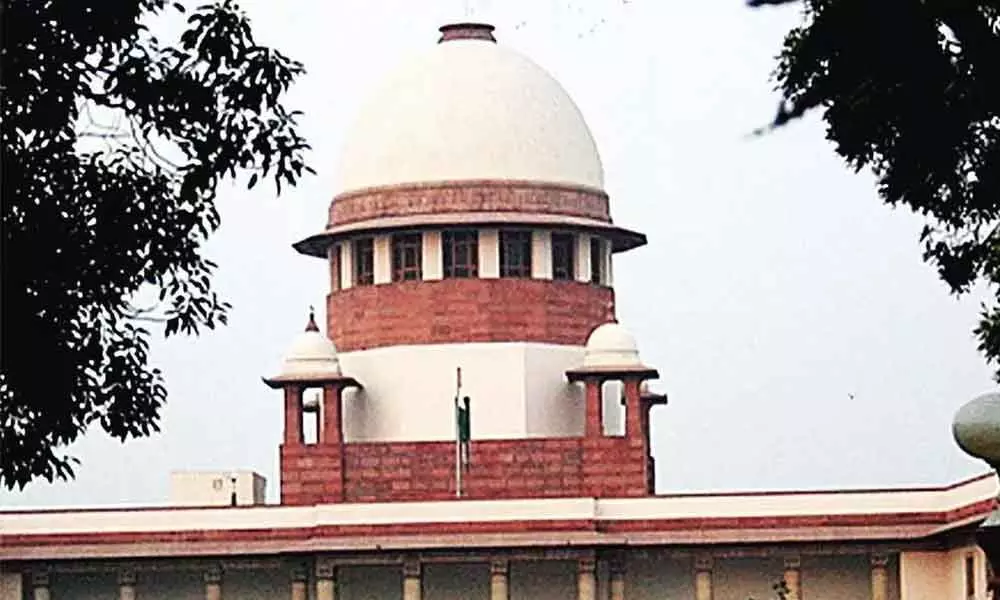Live
- JD-U criticises Pappu Yadav for receiving threatening calls
- INST scientists develop anti-counterfeiting ink to curb document duplication
- 62 dead in flash floods in eastern Spain
- India to face Malaysia in Hyderabad on November 18 for International Friendly
- Militants will get killed as long as they continue to infiltrate: Farooq Abdullah
- PM Modi, HM Shah, CM Yogi among top BJP bigwigs to hold over 170 poll rallies in Maharashtra
- AAP protests against FCI's slow procurement of paddy from Punjab
- Lakshmi Puja 2024: Complete Guide to Diwali Rituals for Prosperity and Good Fortune
- AP govt. appoints BR Naidu as new chairman of TTD
- Odisha CM announces Rs 6 lakh compensation for metro tunnel victims
Just In
Supreme Court to examine if educational institutions, varsities fall under consumer law


Supreme Court
The Supreme Court has agreed to examine the question as to whether an educational institution or university can be sued under the consumer protection law for deficiency in services, saying there have been "divergent views" of the top court on the issue.
NEW DELHI: The Supreme Court has agreed to examine the question as to whether an educational institution or university can be sued under the consumer protection law for deficiency in services, saying there have been "divergent views" of the top court on the issue.
A bench of Justices D Y Chandrachud, Indu Malhotra and Indira Banerjee has admitted an appeal filed by Manu Solanki and other students of a medical course against Vinayaka Mission University at Salem in Tamil Nadu, alleging deficiency in services.
"Since there are divergent views of this Court bearing on the subject as to whether an educational institution or University would be subject to the provisions of the Consumer Protection Act 1986, the appeal would require admission. Admit," the top court said in its order of October 15.
It asked lawyer Soumyajit, appearing on behalf of caveator university, to file the response within six weeks to the appeal filed against a decision of the National Consumer Disputes Redressal Commission (NCDRC).
The university has relied upon apex court judgments in the Maharshi Dayanand University and in the PT Koshy cases to say that these verdicts have held that the education is not a commodity and educational institutions are not providing any kind of service.
Hence, in matter of admission and fees, there cannot be a kind of service and therefore, there cannot be a question of deficiency of service to be adjudicated upon in consumer forum or commissions.
The students, however, cited other judgments in which it has been held that educational institutions would come within the purview of the Consumer Protection Act, 1986.
Solanki and eight other students of the a medical course of the university had sought a compensation of Rs 1.4 crore each alleging deficiency in service and on account of "loss of social standing, academic years, career opportunities, mental and physical agony".
They alleged the university induced them to take admission in the course on a false assurance that it had all the requisite approvals from the authorities.
The students were admitted in the offshore programme in 2005-2006 comprising of two year study in Thailand and two-and-a half year study in the university here, the plea said.
The students were assured that they would be getting their MBBS final degree conferred by the university and recognized by the Indian Government and Medical Council of India.
However, after two years of study in Thailand, the students were informed that they should continue their course at Thailand and would be conferred a Foreign Medical Degree and should subsequently appear for screening test in India, the plea alleged.
The students said they suffered loss of career opportunities as the National Board of Examination said that their qualification was "not a primary medical qualification since the Degree is not recognized by the Medical Council of India or the Council of Thailand".
The NCDRC, in its judgement of January 20, had said, "We are of the considered opinion that the institutions rendering education including vocational courses and activities undertaken during the process of pre-admission as well as post-admission and also imparting excursion tours, picnics, extra co-curricular activities, swimming, sport, etc. except Coaching Institutions, will, therefore, not be covered under the provisions of the Consumer Protection Act, 1986."
Aggrieved by this, the students filed an appeal in the apex court.

© 2024 Hyderabad Media House Limited/The Hans India. All rights reserved. Powered by hocalwire.com






